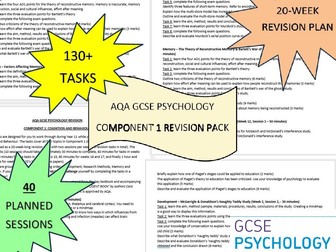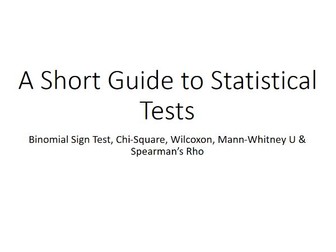
AQA GCSE Psychology Component 1 Revision Pack, 130+ tasks, 40 sessions, 20 week plan
AQA GCSE PSYCHOLOGY REVISION PACK
COMPONENT 1: COGNITION AND BEHAVIOUR
*** 40 revision sessions
20-week revision plan
Over 130 revision tasks
Covers 4 topics: Development, Research Methods, Memory & Perception
Practice exam questions for every session**
Which students would benefit from this resource?
These tasks are designed for Year 11 GCSE students to complete over 2 sessions per week for 20 weeks. There are 40 sessions in total which cover all four topics in Component 1 (Paper 1) and includes exam practice questions in every session.
How long is each session?
It is designed as a 20-week-long revision plan, with a gradual increase in the amount of time the tasks should approximately take as students progress with the tasks.
Weeks 1-5 = 30 mins
Weeks 6-10 = 40 mins
Weeks 11=15 = 50 mins
Weeks 16 & 17 = 60 mins
Weeks 18-20 = 1 hour 45 mins (focus on AQA assessment resources and practice papers/mark schemes).
If students are struggling to complete 9-mark questions within the suggested time frame, I usually have them briefly plan their AO1s rather than attempt the whole question (or write it as a 6-marker!)
What does each session look like? What does it include?
Each session follows a similar format and includes 3-7 tasks (most have 3 or 4).
Tasks are instructional, include suggestions for revision techniques, includes suggestions for structuring an evaluation point, and practice exam questions which range from short-answer questions to 9-mark essays. E.g.:
’Development – Applying Piaget’s Theory to Education’ (Week 2, Session 1 – 30 minutes)
Task 1: learn the definitions of the three concepts (readiness, learning by discovery, individual learning). You can either create a table or a mindmap.
Task 2: learn how to apply each of Piaget’s stages to education. I suggest you list each stage, the developmental task (e.g. egocentrism) and an activity example (e.g. dressing up).
Task 3: learn the three evaluation points using the structure.
Task 4: answer the following exam-style questions.
Briefly explain how one of Piaget’s stages could be applied to education (2 marks)
The application of Piaget’s theory to education has been criticised. Use your knowledge of psychology to evaluate this application (5 marks)
Describe and evaluate the application of Piaget’s stages to education (9 marks)
Why doesn’t it follow the order I taught the topics in?
The tasks are grouped by topic in the following order: Development, Research Methods, Memory and Perception. This is the sequence of topics I personally use (I’m aware this may be unusual!) If students are confident, encourage stretch and challenge by having them complete tasks in a different order or picking at random, perhaps!
Textbook reference: Illuminate Publishing’s: ‘AQA PSYCHOLOGY FOR GCSE – STUDENT BOOK’ by authors Cara Flanagan, Dave Berry, Ruth Jones, Mark Jones, Rob Liddle. The book is approved by AQA.

